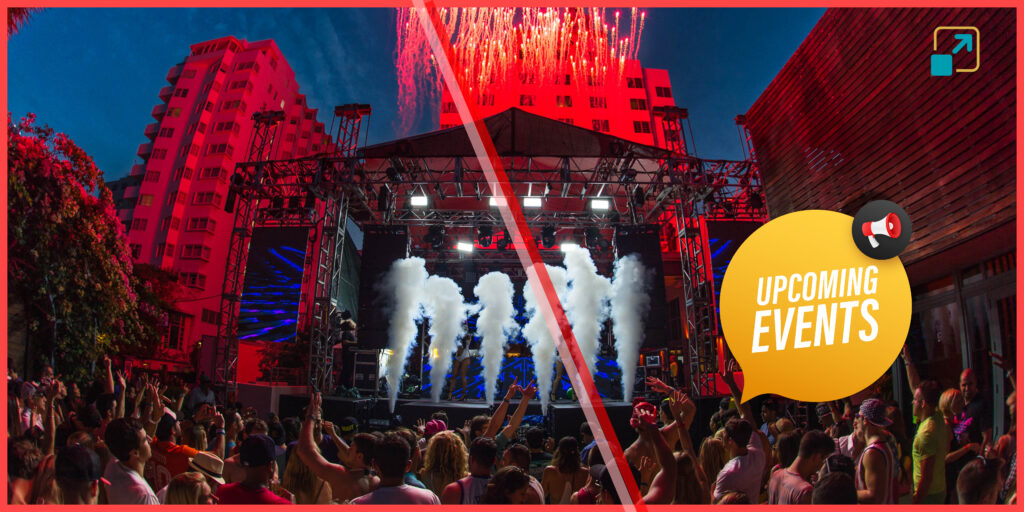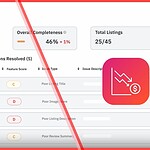Event-driven travel has long been a reliable demand stream. But in 2025, it’s become a battleground. Airbnb, Booking.com, and Vrbo aren’t just reacting to concerts, tournaments, and festivals, but actively shaping how demand is created and captured.
Why does this matter for professional short-term rental (STR) managers? Because the same event can generate entirely different bookings depending on the online travel agent (OTA) platform. Understanding their divergent strategies helps you align pricing, policies, and content with the channel most likely to deliver your ideal guest.
Airbnb: “Don’t just attend — belong.”
Airbnb no longer just lists places to stay, it curates participation. Its global partnerships (e.g. Lollapalooza, Tour de France), and expansion of Experiences and Originals, position it as a platform for cultural immersion.
Move #1: Curated Experiences as Cultural Entry Points
Instead of competing with Booking.com and Vrbo on inventory or price, Airbnb focuses on emotional and cultural relevance. Originals and Experiences create moments guests can’t find elsewhere.
- Cultural alignment trumps generic convenience. Listings that feel plugged into the event, either thematically, geographically, or experientially, will outperform those that don’t.
- Now’s the time to be specific. Update descriptions to reflect proximity to events, or local knowledge (e.g., “Steps from the Lollapalooza entrance,” “Cyclist-friendly home near Stage 12 of the Tour”).
- Add value beyond the stay. Think curated guest guides, experience-style upgrades, or even small touches (festival kits, local recommendations) that tie into the event.
- If you’re not near the main event but can offer something immersive nearby, lean hard into your niche.
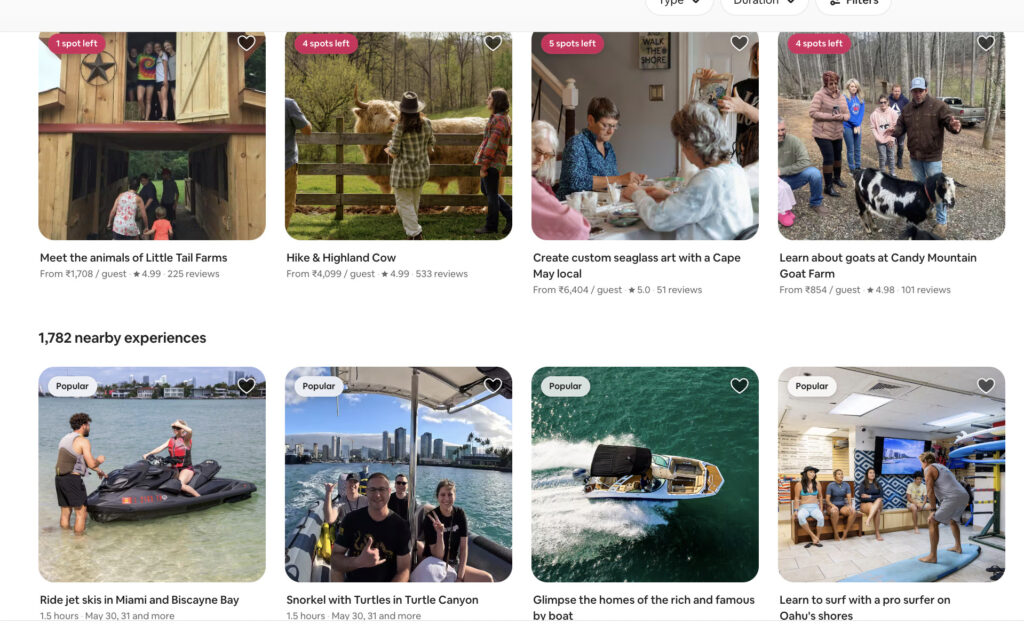
Move #2: Becoming Lifestyle Brand
By crafting exclusive, story-rich inventory (like Airbnb Originals) and artist-led events, Airbnb becomes more than a utility. It becomes a brand people talk about. Like Netflix Originals, these listings and experiences generate cultural capital, social media momentum, and brand loyalty.
- Showcase your listing’s personality. Guests choose places that feel expressive, not generic.
- Airbnb is raising the bar for experiential value, not luxury, but meaning. Guests are choosing listings based on how they feel rather than what they offer on paper.
- For multi-property managers, a consistent visual identity can boost visibility in curated feeds.
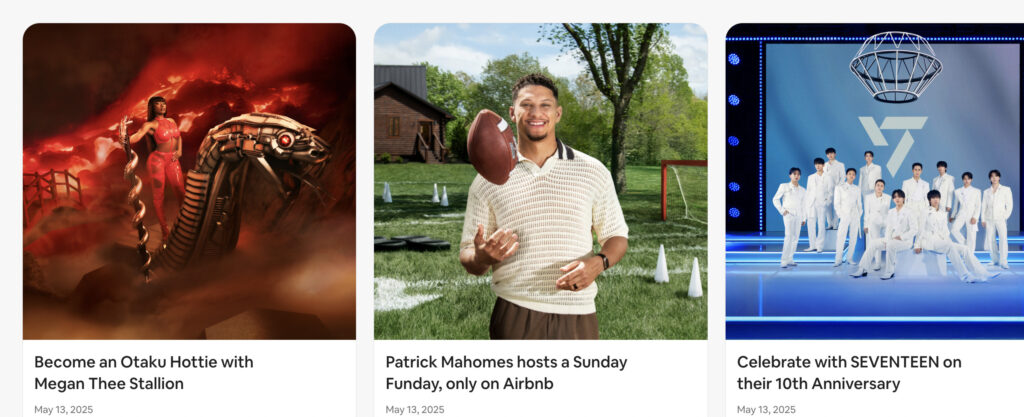
Airbnb Originals, featuring exclusive celebrity-led experiences, include highly produced, one-of-a-kind offerings — from immersive pop culture experiences to sports-focused activities and celebrations tied to major entertainment milestones.
Move #3: Escaping the Price Race
Originals and unique Experiences allow Airbnb to step away from price competition and increase take rates. Because these offerings aren’t easily comparable, Airbnb can charge more and earn more, while guests feel like they’re paying for something rare.
- This is your cue to escape the price-per-night race. If your listing offers something unique, design, access, amenities, or local partnerships, position it as a “limited edition” stay.
- During event surges, you don’t have to be the cheapest. You have to be the most compelling. Price for emotional value, not square footage.
Move #4: Loyalty via Identity, Not Discounts
Where Booking.com relies on loyalty tiers and discounts, Airbnb is betting on meaning over margin. Experiences and Originals drive emotional connection and longer stays, fostering platform loyalty over price sensitivity.
- Focus your messaging on guest aspiration, not guest utility. Why would someone choose your home if they’re here for the Tour de France or a music festival? Make that story clear.
- The more you lean into the emotional logic of travel, connection, discovery, meaning, the more Airbnb’s algorithm may favor your listing, especially in curated collections.
- But beware: this also raises guest expectations. Identity-driven guests expect a story that matches what they were sold. Fall short, and the review will reflect it.
Move #5: Diversify Revenue Beyond Stays
As regulations squeeze short-term rentals in many markets, Airbnb is investing in experiences that aren’t tied to a property: walking tours, concerts, meetups, etc. This makes the platform less vulnerable to housing-specific restrictions.
- Airbnb may be de-risking, but you aren’t. If event-driven travel boosts demand in your area, but local STR rules restrict your calendar, you could lose out even while Airbnb profits.
- Use Airbnb’s promotional wave to attract first-time guests, but divert them to direct channels for return visits. Capture emails, offer loyalty perks, or upsell exclusive deals off-platform.
- Partner with local experience providers to offer packages that ride the event demand without relying solely on STR occupancy. Airbnb is doing it at scale, you can do it locally.
Booking.com: “Don’t miss out! We’ll help you afford it.”
When it comes to event-driven travel, Booking.com isn’t selling the story of the event. it’s selling the ease of attending it. Whether it’s Eurovision, the NBA, or UEFA Women’s EURO 2025, Booking.com positions itself not as the cultural hub, but as the frictionless gateway. Just book it. Get a deal. Move on.
Booking.com’s strategy is shaped by its performance marketing DNA: Convert fast, convert often, and outscale everyone. That strategy creates a very specific guest profile, and a very specific playing field for property managers.
Move #1: Instant Booking at Scale
Booking.com is engineered for volume. Every element, from UX design to loyalty discounts to urgency copy, is optimized for conversion speed. The platform is less about discovery, more about decision efficiency.
- Your listing needs to convert instantly. Keep descriptions clean, highlight key amenities upfront, and avoid storytelling fluff.
- Instant book is critical. Manual approval requests disrupt the flow and hurt visibility.
- Optimize for mobile-first behavior, this is where Booking.com guests are searching and booking, especially around events.
Move #2: Aggressive Incentives and Loyalty Engineering
From 50% cashback promos to Genius loyalty rewards, Booking.com uses financial levers to buy guest behavior, and it works. Guests are primed to expect deals, and the platform trains them to stay loyal with tangible rewards.
- Be ready to compete on price, especially during high-traffic events. Use Booking.com’s Promotions Suite to create time-bound discounts (last-minute, early bird, mobile-only).
- Expect bookings to be shorter, more price-sensitive, and potentially more last-minute than on other platforms.
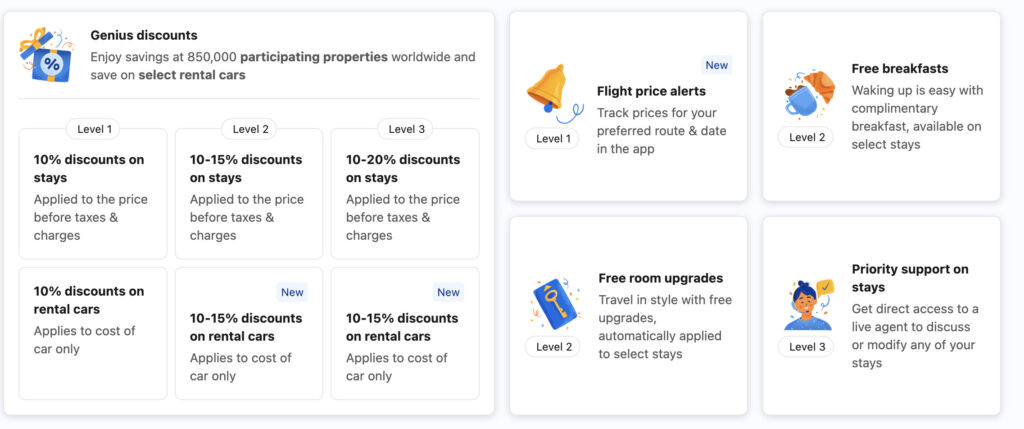
Move #3: Platform-Controlled Guest Relationships
Guest communication is fully mediated and time-bound. Hosts receive anonymized email proxies, and messaging access typically ends a few days post-checkout. Past guests can’t be re-engaged unless they initiate a new booking.
- Booking.com controls the guest lifecycle, you can’t build long-term relationships through the platform.
- Focus on maximizing the value of each individual stay. Use upsells, great service, and timely replies to earn high reviews (which do affect ranking).
- If you want to turn Booking.com guests into repeat guests off-platform, you’ll need to get creative, within policy. Printed materials, local guides, or soft prompts can encourage direct rebooking later.
Strategic Move #4: Built for Conversion, Not Discovery
While Airbnb emphasizes discovery and Vrbo leans on family rituals, Booking.com focuses on real-time price, availability, and urgency messaging.
- Urgency cues like “Booked 14 times today” or “Only 1 left!” set guest expectations, you need to deliver on that promise with fast replies, up-to-date calendars, and flawless execution.
- Booking.com’s algorithm rewards listings with high responsiveness and reliable availability.
- Use the Analytics tab to track conversion metrics and bounce rates. Tweak pricing and promos in real time during high-demand windows.
Move #5: Outspending Rivals for Visibility
Booking.com isn’t just competing with Airbnb or Vrbo, it’s competing with Google itself. It invests heavily in paid traffic. That means acquisition costs are high, and conversion pressure is intense.
- You’re in a pay-to-play environment. Booking.com brings the traffic, but only listings that perform well in clicks and conversions will benefit from it.
- That urgency you see on the platform? It’s not cosmetic. It’s engineered to justify the ad dollars being spent to bring the guest in.
- You may pay a higher commission, but you’re also tapping into one of the most powerful event-driven funnels in the industry.
Vrbo: “The game happens on the field, but the memories are made at home.”
Vrbo isn’t fighting to be part of the action. It’s winning the moments around it: tailgates, weddings, reunions. It attracts groups that plan in advance, stay longer, and value space.
This positioning is not loud. But it’s deliberate, and increasingly strategic as Expedia Group begins modernizing Vrbo’s toolset behind the scenes.
Move #1: Pre- and Post-Event Positioning
Vrbo leans into tradition-driven travel, college football weekends, weddings, family reunions, where the event is important, but the real memories are made at home. Their Nick Saban campaign doesn’t mention tickets or stadiums. It’s about who you’re with, not what you’re attending.
- Optimize listings for group comfort, not event proximity. Your headline doesn’t need to say “Close to Stadium”, it should say “Spacious family retreat with room for 10.”
- Highlight features like multiple bedrooms, large kitchens, patios, fire pits, game rooms, and gathering spaces. These convert better than sleek design or trendy themes.
- Recognize that your booking may align with an event, but it’s motivated by group logistics and social rituals.
Move #2: Whole-Home, Multi-Night Bookings
Vrbo’s foundation has always been family-sized, whole-home inventory. Its platform wasn’t built for one-night stays or solo travelers. It thrives on longer bookings, larger parties, and pre-planned travel.
- Vrbo’s guests are planners. They book earlier, stay longer, and are often the “organizers” of group trips.
- Your pricing and calendar settings should reflect that: open your calendar early, encourage 3+ night stays, and minimize one-night availability.
- These guests are less likely to comparison shop across platforms. They’re looking for space, trust, and reliability.
Move #3: Consistency Over Novelty
Vrbo’s emotional value proposition isn’t “explore something new” (Airbnb) or “book it fast” (Booking.com). It’s “return to something reliable.” It’s the place you go every year, with the people you love, to do the thing you’ve always done.
- Don’t over-design or over-theme your listing. Aim for inviting, familiar, functional.
- Build repeat business by delivering a consistently good experience: fast response times, easy check-in, and no surprises.
- Encourage guests to return for next year’s game, tournament, or family tradition. Vrbo guests often want to make it a ritual.
Move #4: Quiet Evolution
While Vrbo’s image remains traditional, Expedia Group is quietly evolving it. In Q1 2025, Vrbo reported growth in shorter stays and urban, multi-unit listings. It also launched a new Promotion Suite with tools like early-bird rates, last-minute discounts, and member-only deals.
- Vrbo is becoming more viable for urban listings and event-adjacent inventory (e.g., apartments near stadiums, small homes near concert venues).
- If you previously relied on Airbnb or Booking.com for event surges, Vrbo is now a secondary or complementary channel, especially for overflow demand.
- Take advantage of promotional tools during high-demand weekends, even if Vrbo guests are less impulsive, they’re still price-aware.
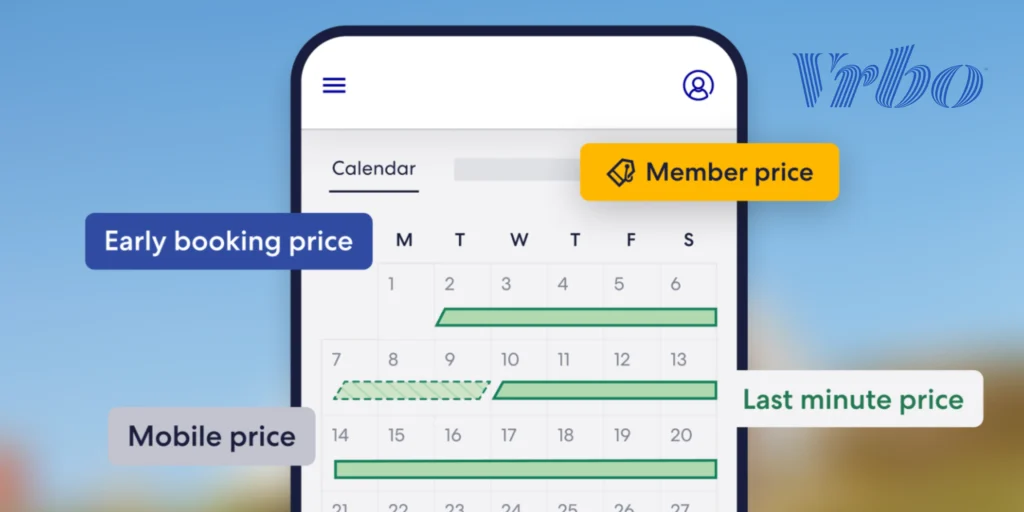
Move #5: Powered by Expedia’s Backend
Unlike Airbnb’s front-facing ecosystem or Booking.com’s urgency marketing, Vrbo lets Expedia Group’s paid search, SEO, and metasearch dominance drive traffic.
- Vrbo’s guest flow may look passive, but it’s well-optimized for high-intent traffic. If your property aligns with what these guests are searching for, space, comfort, predictability, you’ll show up.
- Don’t mistake quiet branding for low performance. Vrbo is a powerful channel for the right kind of trip, and event gatherings are a sweet spot.
Not All Events Are Equal—And Neither Is the Demand They Create
When we talk about “event tourism,” it’s tempting to treat all events the same: big demand spike, surge pricing, booked calendars. But that’s a mistake.
In reality, different types of events create different demand patterns, and they call for different operational and pricing strategies. If you’re preparing for a holiday, a major sports tournament, or a touring concert, you need to know which rules apply, and when to break them.
1. Fixed-Date, Recurring Events (e.g. New Year’s Eve, July 4th, Christmas)
These are the easiest to plan for. The dates don’t move, and the demand patterns are well-established.
What to do:
- Use historical data and year-over-year trends to confidently set rates and minimum stays
- Apply early-bird pricing, then increase closer to the date
- Consider holding inventory until key booking windows if you’ve seen strong last-minute performance
2. Shifting-Date, Recurring Events (e.g. Easter, Ramadan, Tour de France)
These happen every year, but the dates move, and that can throw off your pricing if you rely on static calendars.
What to do:
- Watch for mismatches between calendar assumptions and actual booking trends
- Adjust your pricing and minimum stays to follow the demand, not the date
- Promote flexible stays around the event window, especially if dates fall midweek
3. One-Time, Irregular Events (e.g. Olympics, World Expo, Taylor Swift tour)
These are high-risk, high-reward. They generate major attention, but also come with uncertainty: demand windows can be narrow, guests may book early or late, and OTA strategies may or may not align with your local reality.
What to do:
- Set event-specific pricing and cancellation policies early
- Create packages or extended-stay incentives
- Monitor OTA campaigns, some may align with your local strategy, others won’t
- Be ready to adjust quickly: bookings can come all at once or in waves
The best way to avoid guesswork is to let your pricing tool do the work for you. A dynamic pricing solution like PriceLabs automatically accounts for these different event types by analyzing market-level demand patterns, lead times, and competitor behavior. It adapts your prices and rules in real time so you’re not left scrambling when calendars shift or booking trends change unexpectedly.
Uvika Wahi is the Editor at RSU by PriceLabs, where she leads news coverage and analysis for professional short-term rental managers. She writes on Airbnb, Booking.com, Vrbo, regulations, and industry trends, helping managers make informed business decisions. Uvika also presents at global industry events such as SCALE, VITUR, and Direct Booking Success Summit.

